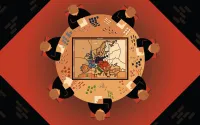Is Turkey European? Will Turkey be accepted as part of the European Union? This question, which has been lingering for a good twenty (if not fifty) years, gets very little attention outside of Turkey and to a much lesser extent in western Europe. Yet, it is one of the more important geopolitical issues of the coming decades.
An intelligent answer to this question has to start in the sixteenth century, when the Ottoman Empire was at its peak of glory and importance under Suleiman the Magnificent. At that time, the Ottoman Empire seemed to be the anti-Europe - a Muslim empire expanding everywhere, including into Christian Europe. It not only controlled most of what we now think of as the Arab world, but it was conquering all of southeastern Europe. This culminated in the seventeenth century, in the so-called Türkenjahr, when the Habsburg emperor successfully resisted the second Ottoman siege of Vienna, in the very center of Europe. After this, the Ottoman Empire began to recede slowly, until in the nineteenth century, it was considered the "sick man of Europe." Yet, note, it was called the sick man "of Europe."
The Ottoman Empire finally collapsed in the wake of the First World War. The military hero of the battle of the Dardanelles in 1915, Mustafa Kemal (later to be called Atatürk, father of the Turkish people), founded in 1919 a national liberation movement that was dedicated to the creation of a Turkish republic, nationalist and secular. By 1922, the Ottoman Sultanate was abolished. In 1923, the Turkish Republic was proclaimed, with Atatürk as President. And in 1924, the caliphate, that is, the religious authority that the Ottoman Sultan had incarnated, was abolished as well. (When in 2001, Osama bin Laden, referred to 80 years of Muslim humiliation, he specifically traced it to the abolition of the caliphate.)
The program of Atatürk was resolutely "Westernizing" - transformation of the legal system, liberation of women, abolition of religious symbols (such as the wearing of the fez), and above all "Etatism" - the central role of the state in the life of the citizens. Westernizing, but not pro-European, in the sense that the Turkish republic was vigorously anti-imperialist, and played the role in the League of Nations that we associate later with the role of India in the United Nations - a constant critic of colonialism and imperialism. While relations with the Soviet Union were initially good (shared anti-imperialist sentiments), they deteriorated seriously in the interwar period. And in the Second World War, Turkey remained neutral, to the great displeasure of the Allies.
When, in 1946, Great Britain announced its political withdrawal from the Middle East, the United States took up the slack. The Truman Doctrine put the U.S. squarely behind the governments of Greece and Turkey in the face of what they and the U.S. considered the Soviet menace. So, when NATO was formed in 1949, it seemed self-evident that Turkey would become a member. And when the United Nations appealed for troops to aid South Korea in 1950, Turkey responded in an important way. By now, Turkey had shifted its cultural model of Westernization from France (initially favored in the 1920s) to the United States.
When the party founded by Atatürk began to lose strength for the first time in the post-1945 period, the Turkish armed forces moved into the foreground as the principal guarantor of secular nationalism and Etatism (that is, a homogeneous Jacobin version of the role of the state). When, in the 1970s, the then European Economic Community began to expand into southern Europe, Turkey indicated its interest, but it was passed over. It is not sure, however, that Turkey itself was all that anxious at that point to join Europe.
Turkey was consumed by its internal problems: an armed forces that had seized power on several occasions, an emergent rebellion of the large Kurdish population located in southeastern Turkey, and the beginnings of an Islamist revival. For the mainstream Turks, and especially the armed forces, Kurds did not exist. There were only Turks. And they were unwilling to allow any recognition of group rights, including linguistic rights. The armed forces repressed rebellion, at very great cost. Nor were the armed forces willing to make any concessions to Islamists. They too were repressed. This was however an era of increasing concern in western Europe with human rights and the pattern of brutal repressions and military takeovers was deemed in western Europe very unacceptable in a country aspiring to integration in European institutions. There was a second consideration. In the 1950s, western Europe needed an influx of workers to sustain its expanding industries. And they turned in particular to Turks. This was especially true of Germany, which had a large Gastarbeiter program. But in the 1970s, with the beginning of the Kondratieff B-phase and therefore of increased unemployment, both the governments and the public began to think that the Turks should go home. However, by now, we were into second-generation Turks, born in Germany and elsewhere in western Europe, who considered themselves natives of these countries and wished not only to remain but to exercise the full rights of citizens. As the Turks remained in western Europe, and as many North Africans came also to migrate there (especially but not only to France), the percentage of Muslim population began to grow markedly. And as Islamism began to grow in influence among these Muslims, acute cultural (and political) conflicts began to play an important role in the daily life of western Europe.
In the 1990s, after the collapse of the Soviet Union, western Europe turned to the incorporation of east-central Europe into its institutions. And Turkey was moved repeatedly to a place after these countries. Meanwhile, in Turkey, a remarkable thing occurred. An Islamist movement actually came to political power. But it was an unusually "moderate" Islamist movement, which became more enthusiastic about integration into Europe than the old Etatist military. The Islamists in power saw Europe as a guarantee of their civil rights. So did the Kurds. The United States also favored Turkish integration into Europe, seeing it as constraining any tendency of Turkey to break with the West, and therefore with the United States.
With the prospect of Turkey actually joining the European Union looming on the horizon, some west European leaders began to verbalize their fears, notably Valérie Giscard d'Estaing and Helmut Kohl, who openly suggested that Turkey did not fit. What they meant of course was that including Turkey into the European Union would suddenly augment significantly the percentage of Muslims in Europe. But this was a moment when France was banning the wearing of the Muslim head covering by girls in school. And politicians throughout Europe were beginning to respond openly to anti-Muslim fears.
Suddenly, the issue has become acute, for Europe and for Turkey. For Europe, the issue is whether Europe will base its future on being a Christian culture or being a secular culture. It should be noted that, at this very moment, Europeans are debating fiercely whether, in the new constitution, there will be explicit reference to the Christian heritage of Europe, something being strongly pushed by the Vatican. The seeds of expanded internal turmoil depend on the degree to which Europe can or cannot find ways to make cultural space for its inevitably increasing Muslim population. Integrating Turkey is seen by some as tilting the balance in the direction of greater turmoil. But it is seen by others as one of the best ways of overcoming this turmoil.
Meanwhile, in the greater Middle East, as the Bush administration likes to call it, a rejection of Turkey in Europe could add a major factor to the equation. Turkey is Muslim but it is also the heir to Ottoman domination of the Arab world, and has been regarded with great suspicion by the Arab populations and states ever since their independences. On the other hand, were Turkey to be barred definitively from Europe, it is quite possible that the "moderate" Islamism now in favor might give way to a less "moderate" version, something that would rebound on Europe significantly. Turkey in Europe is not a minor question.






